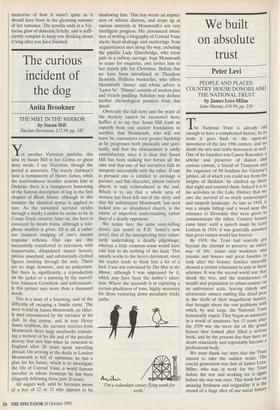The curious incident of the dog
Anita Brookner
THE MIST IN THE MIRROR by Susan Hill Sinclair-Stevenson, £13.99, pp. 185 et another Victorian pastiche, this time by Susan Hill in her Gothic or ghost story mode. I say Victorian, though the period is uncertain. The stately clubman's tone is reminiscent of Henry James, while the multitudinous weather systems hint at Dickens: there is a transparent borrowing of the famous description of fog in the first chapter of Bleak House, although in this instance the identical syntax is applied to rain. As the unnamed narrator strides through a murky London he seems to be in Conan Doyle country; later on, the hero is conveyed by steam trains, although a tele- phone number is given. All in all, a rather too insistent nudging of one's instant response reflexes. One can see this successfully transferred to television, with manservants, dilapidated manor houses, pitiless moorland, and substantially clothed figures looming through the mist. There are no dogs, however, and no policemen. But there is, significantly, a reproduction on the jacket or a painting by the marvel- lous Atkinson Grimshaw, and unfortunate- ly this picture says more than a thousand words.
This is a story of a haunting, and of the difficulty of escaping a family curse. The story is told by James Monmouth, an elder- ly man encountered by the narrator at his club. In due course, and in true Henry James tradition, the narrator receives from Monmouth three large notebooks contain- ing a memoir of his life and of the peculiar destiny that met him when he returned to England after 20 years spent travelling abroad. On arriving at the docks in London Monmouth is full of optimism: he has a plan for his future, which is to investigate the life of Conrad Vane, a world famous traveller in whose footsteps he has been diligently following these past 20 years.
All augurs well, until he becomes aware of a boy of 12 or 13 who appears to be shadowing him. This boy wears an expres- sion of infinite distress, and crops up at various intervals in Monmouth's not very intelligent progress. His announced inten- tion of writing a biography of Conrad Vane elicits head-shakings and mutterings from acquaintances met along the way, including the psychic Lady Qincebridge, who turns pale in a railway carriage, begs Monmouth to cease his enquiries, and invites him to her stately pile for Christmas. Before this we have been introduced to Theodore Beamish, Holborn bookseller, who offers Monmouth 'dinner' and whose advice is 'Leave be'. 'Dinner' consists of mutton pies and treacle pudding. Scholars may deduce further chronological pointers from this detail.
Obviously the full story and the point of the mystery cannot be recounted here. Suffice it to say that Susan Hill leads us expertly from one ancient foundation to another, that Monmouth, who will not leave be, encounters even greater hardship as he progresses both physically and spiri- tually, and that the denouement is oddly unsatisfactory, since it is clear that Susan Hill has been stalking two horses all the time and that one of her narratives fails to integrate successfully with the other. If one is pursued one is entitled to envisage a pursuer, and this character, almost entirely absent, is only reintroduced at the end. Which is to say that a whole area of menace has been left out of the story, and that the unfortunate Monmouth, last seen locked into an abandoned church, is the victim of imperfect understanding rather than of a deadly opponent.
We notice here the same story-telling device last noted in P.D. James's new novel, that of the unsuspecting hero volun- tarily undertaking a deadly pilgrimage, whereas a little common sense would have told him to do nothing of the kind. This usually works to the hero's detriment, since the reader tends to think him a bit of a fool. I was not convinced by The Mist in the Mirror, although I was oppressed by it, which may have been the author's inten- tion. Where she succeeds is in capturing a certain pluckiness of tone, highly necessary for those venturing down peculiarly tricky paths.
'I'm a redundant canary flying south for work'


































































 Previous page
Previous page